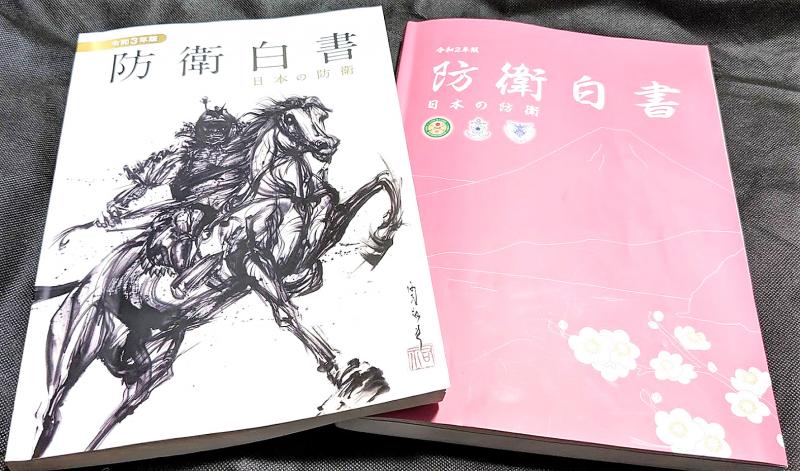Significant changes in Japan’s annual defense white paper, including for the first time a declaration of support for stability in the Taiwan Strait and separate treatment of Taiwan, show Tokyo’s growing affinity and respect for the nation.
The annual report approved by the Japanese Cabinet yesterday mentions China’s “intensified military activities around Taiwan,” including the incursion of Chinese aircraft in the nation’s southwestern airspace amid a growing military imbalance.
It also discusses the clarity of US support for Taiwan through warship transits and arms sales.

Photo: Lin Tsui-yi, Taipei Times
“Stabilizing the situation surrounding Taiwan is important for Japan’s security and the stability of the international community,” the paper says. “Therefore, it is necessary that we pay close attention to the situation with a sense of crisis more than ever before.”
The statement marks a significant shift from previous reports, which have refrained from providing a clear stance on Taiwan.
In the past few months, Tokyo has not been reticent in expressing its opinion that the Taiwan question should be resolved peacefully through dialogue, including in a joint statement with the US at a G7 summit last month.
While the Japanese Ministry of Defense has emphasized that the nation’s basic stance toward Taiwan has not changed, its treatment of the issue in the latest white paper says otherwise.
Perhaps most striking is its decision to move discussion of Taiwan from the chapter on China to a new section on US-China relations, adjusting an arrangement that has long drawn the ire of Taiwanese expat groups in Japan.
Critics have said that relegating Taiwan to a subsection on China could mislead readers into thinking that the Chinese People’s Liberation Army includes Taiwan’s military, when it is Taiwan’s largest and only enemy.
Even though the general focus of the section on US-China relations is on worsening confrontations between the two powers, it still manages to treat Taiwan as its own subject by detailing its developing relations with the US over the past year and military imbalance with China.
Mentioning that the balance is “tilting to China’s favor,” the report also recommends that attention be paid to the improvements of Chinese and Taiwanese forces, US arms sales to Taiwan and Taiwan’s indigenous military developments.
The report also corrects a map of Chinese military capabilities repeated in previous versions that expat groups have long protested should not include Taiwan.
It follows a similar correction of a COVID-19 map by the Japanese Ministry of Health, Labour and Welfare last year at the urging of expat groups.
International readers have also been granted consideration through small changes such as presenting years only in the Western format.
However, the clearest sign of the ministry’s change in stance can be seen in the cover design.
Thirty-four-year-old sumi-e artist Yu-ki Nishimoto was commissioned to design the cover, a bold depiction of a warrior on horseback, with the intention of attracting younger readers.
The image stands in sharp contrast to last year’s cover, a minimalist pink outline of Mount Fuji with cherry blossoms, which was itself a pronounced change from the report’s formerly rigid presentation.

‘DENIAL DEFENSE’: The US would increase its military presence with uncrewed ships, and submarines, while boosting defense in the Indo-Pacific, a Pete Hegseth memo said The US is reorienting its military strategy to focus primarily on deterring a potential Chinese invasion of Taiwan, a memo signed by US Secretary of Defense Pete Hegseth showed. The memo also called on Taiwan to increase its defense spending. The document, known as the “Interim National Defense Strategic Guidance,” was distributed this month and detailed the national defense plans of US President Donald Trump’s administration, an article in the Washington Post said on Saturday. It outlines how the US can prepare for a potential war with China and defend itself from threats in the “near abroad,” including Greenland and the Panama

A wild live dugong was found in Taiwan for the first time in 88 years, after it was accidentally caught by a fisher’s net on Tuesday in Yilan County’s Fenniaolin (粉鳥林). This is the first sighting of the species in Taiwan since 1937, having already been considered “extinct” in the country and considered as “vulnerable” by the International Union for Conservation of Nature. A fisher surnamed Chen (陳) went to Fenniaolin to collect the fish in his netting, but instead caught a 3m long, 500kg dugong. The fisher released the animal back into the wild, not realizing it was an endangered species at

The Chinese Nationalist Party (KMT) is maintaining close ties with Beijing, the Democratic Progressive Party (DPP) said yesterday, hours after a new round of Chinese military drills in the Taiwan Strait began. Political parties in a democracy have a responsibility to be loyal to the nation and defend its sovereignty, DPP spokesman Justin Wu (吳崢) told a news conference in Taipei. His comments came hours after Beijing announced via Chinese state media that the Chinese People’s Liberation Army’s Eastern Theater Command was holding large-scale drills simulating a multi-pronged attack on Taiwan. Contrary to the KMT’s claims that it is staunchly anti-communist, KMT Deputy

The High Prosecutors’ Office yesterday withdrew an appeal against the acquittal of a former bank manager 22 years after his death, marking Taiwan’s first instance of prosecutors rendering posthumous justice to a wrongfully convicted defendant. Chu Ching-en (諸慶恩) — formerly a manager at the Taipei branch of BNP Paribas — was in 1999 accused by Weng Mao-chung (翁茂鍾), then-president of Chia Her Industrial Co, of forging a request for a fixed deposit of US$10 million by I-Hwa Industrial Co, a subsidiary of Chia Her, which was used as collateral. Chu was ruled not guilty in the first trial, but was found guilty